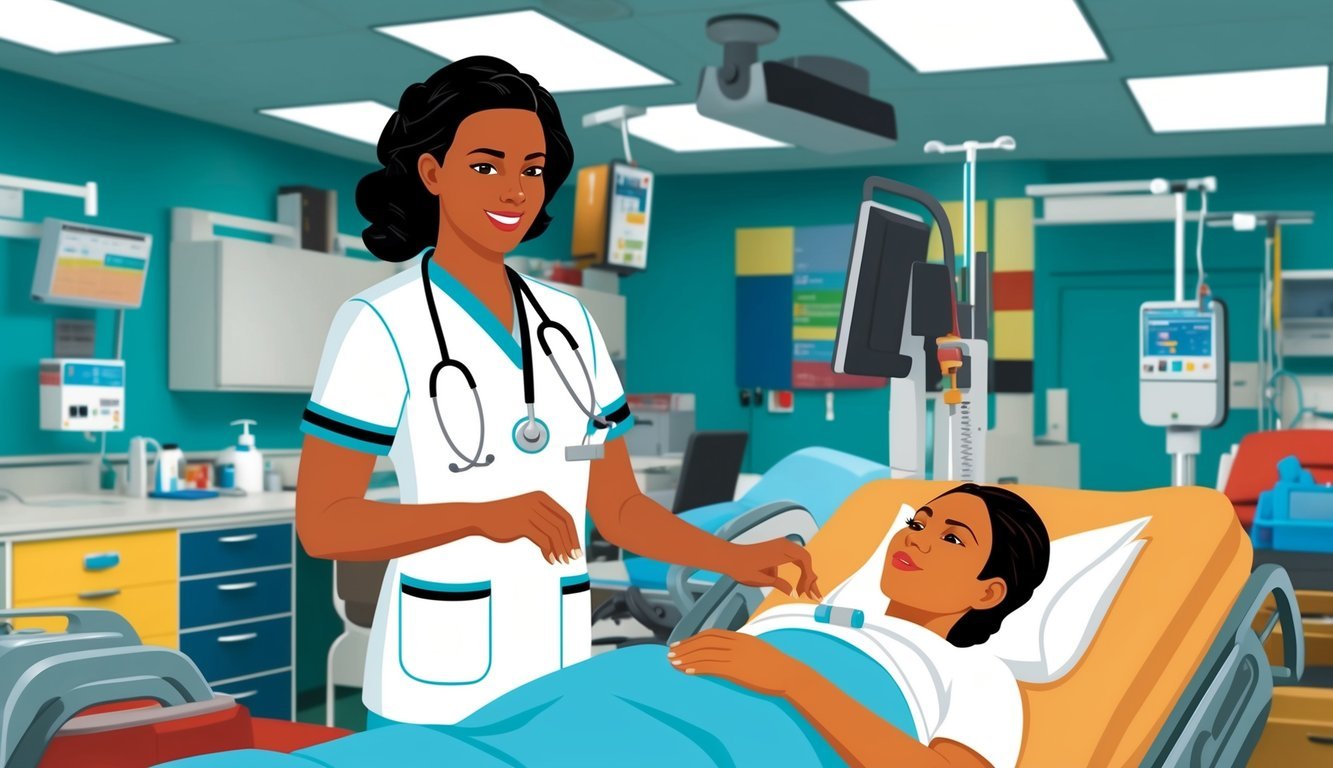Becoming a nurse in Maryland is a fulfilling journey that requires dedication and education.
To start your path, you need to complete the necessary educational requirements, pass a licensing exam, and gain clinical experience.
This career is not only about providing care but also about making a significant difference in the lives of patients and communities.
Maryland offers various nursing programs and support from the Maryland Board of Nursing, making it easier to find the right fit for your education.
With over 40,000 nurses in the state, the demand for qualified healthcare professionals continues to grow, presenting numerous opportunities for employment and career advancement.
As you explore your path to nursing, know that each step is vital for your success.
Understanding the licensing process and gaining hands-on experience will prepare you for a rewarding career in healthcare.
Key Takeaways
- A nursing career in Maryland requires specific educational and licensing steps.
- Clinical experience is essential for developing skills in healthcare.
- Opportunities for career advancement are readily available in the nursing field.
Understanding the Path to Becoming a Nurse in Maryland
Becoming a nurse in Maryland involves various educational pathways and specific state requirements.
Familiarizing yourself with these key aspects will help you navigate the process effectively.
Educational Pathways
To become a nurse in Maryland, you generally have two main educational options: the Associate Degree in Nursing (ADN) and the Bachelor of Science in Nursing (BSN).
- Duration: Typically 2-3 years
- Focus: Prepares you for entry-level nursing roles.
- Outcome: Qualifies you to take the NCLEX-RN exam.
BSN Program
- Duration: About 4 years, or as little as 16 months for those with a prior bachelor’s degree.
- Focus: Offers a broader education that includes leadership and management skills.
- Outcome: Often preferred by employers and qualifies you for advanced practice roles.
Both programs must be accredited by reputable bodies like the Commission on Collegiate Nursing Education (CCNE) or the Accreditation Commission for Education in Nursing (ACEN) to ensure quality education.
State Requirements and the Maryland Board of Nursing
After completing your nursing education, you will need to fulfill specific requirements set by the Maryland Board of Nursing.
Here are the steps involved:
-
Pass the NCLEX-RN Exam: This national exam tests your knowledge and skills. A passing score is essential for licensure.
-
Submit an Application: You must apply for licensure through the Maryland Board of Nursing. This includes providing proof of education and passing the NCLEX-RN.
-
Background Check: A criminal background check is required as part of the application process.
-
Obtain Your License: Once approved, you will receive your RN license, allowing you to practice in Maryland.
Staying informed about these steps is crucial.
For detailed requirements, consult the Maryland Board of Nursing’s official website for the most current information.
Nursing Education and Accreditation
Nursing education in Maryland offers various pathways to become a nurse, from foundational degrees to advanced practice.
It is crucial to choose an accredited program to ensure quality education and eligibility for licensure.
Bachelor of Science in Nursing (BSN) Programs
A Bachelor of Science in Nursing (BSN) is a popular choice for many aspiring nurses.
This program typically takes four years to complete and includes both classroom instruction and clinical experience.
Key institutions offering BSN programs include:
| University Name | Program Length |
|---|---|
| University of Maryland | 4 years |
| Towson University | 4 years |
| Salisbury University | 4 years |
BSN graduates have higher job prospects and can pursue roles in management or specialized fields.
Additionally, many hospitals prefer or require a BSN for registered nursing positions.
Accreditation by bodies like the Commission on Collegiate Nursing Education (CCNE) is vital for these programs to ensure they meet educational standards.
Associate Degree in Nursing (ADN) Programs
The Associate Degree in Nursing (ADN) is generally a two-year program focused on practical nursing skills.
It is often offered by community colleges, such as Chesapeake College, making it a more accessible option for many students.
ADN programs cover essential areas such as:
- Nursing Fundamentals
- Patient Care
- Pharmacology
Graduates are eligible to take the NCLEX-RN exam to become licensed registered nurses.
While this degree can lead to immediate employment, some employers may prefer candidates with a BSN due to evolving healthcare demands.
Advanced Nursing Degrees
For those looking to advance their careers, obtaining a Master of Science in Nursing (MSN) or a Doctor of Nursing Practice (DNP) is beneficial.
These programs typically require a BSN as a prerequisite and focus on specialized skills and leadership.
Popular advanced programs include:
| Degree Type | Focus Areas |
|---|---|
| Master of Science in Nursing (MSN) | Nurse Practitioner, Nurse Educator |
| Doctor of Nursing Practice (DNP) | Clinical Leadership, Policy |
Maryland offers various options for advanced degrees at institutions like the University of Maryland School of Nursing.
These programs are accredited and prepare you for roles in healthcare management, education, and advanced clinical practice.
Licensing and Examination
To become a nurse in Maryland, you need to pass the necessary exams and obtain your nursing license from the Maryland Board of Nursing.
This process will ensure that you meet the standards set for registered nurses (RNs) in the state.
NCLEX-RN Licensure Exam
You must pass the NCLEX-RN exam to become a registered nurse in Maryland.
This exam tests your knowledge and skills in nursing.
It’s designed to ensure that you are ready to provide safe and effective care to patients.
Here’s a quick overview of important details about the NCLEX-RN:
| Detail | Information |
|---|---|
| Eligibility | Must have completed an accredited nursing program. |
| Registration | Register through the National Council of State Boards of Nursing. |
| Cost | Exam fees vary, typically around $200. |
| Retake Policy | You can retake the exam after 45 days if you do not pass. |
For more information about the exam, visit the official site of the National Council of State Boards of Nursing.
Maryland Nursing License
Once you pass the NCLEX-RN, you will need to apply for your Maryland nursing license.
This involves submitting an application and providing necessary documents, such as proof of your nursing education and exam results.
Key steps for obtaining your Maryland nursing license include:
- Complete the Application: Fill out the application form available on the Maryland Board of Nursing website.
- Submit Background Check: You are required to undergo a fingerprint background check.
- Pay Fees: There is a fee associated with applying for your license, usually around $80.30.
- Wait for Approval: The processing time can take 4-6 weeks.
Make sure to check the Maryland Board of Nursing’s website for detailed instructions and updates on the licensing process.
Clinical Experience and Skills Development

Gaining hands-on training and developing critical thinking skills are essential for becoming a competent nurse in Maryland.
These experiences not only prepare you for patient care but also build the nursing competencies necessary for effective nursing practice.
Hands-On Training
Hands-on training is a key part of your nursing education.
This includes clinical rotations where you work directly with patients under the supervision of experienced nurses or instructors.
Through these rotations, you gain valuable insights into real-world nursing scenarios.
During your training, you will learn practical skills such as:
- Administering medications
- Implementing care plans
- Monitoring vital signs
These experiences allow you to apply theoretical knowledge in a practical setting.
Programs like the ones offered at the University of Maryland emphasize such practical experiences.
As you engage with patients, you’ll develop communication skills and empathy, both crucial for effective nursing.
Critical Thinking and Competencies
Critical thinking is vital in nursing.
You will need to analyze situations quickly and make informed decisions about patient care.
This skill helps in assessing patient needs and determining appropriate interventions.
Develop your competencies in areas such as:
- Patient assessment
- Crisis management
- Team collaboration
These competencies are often assessed during your clinical experiences.
You will be taught to evaluate patient conditions, prioritize care, and collaborate with healthcare teams.
Programs training nurses focus on enhancing these skills, ensuring you are prepared for the complexities of nursing practice.
Strong critical thinking abilities lead to better patient outcomes and improved health care quality.
Career and Professional Development

As you advance in your nursing career, exploring specializations and committing to ongoing education are key aspects of your professional growth.
These steps can open up new opportunities and enhance your skills in the field.
Specializations and Advanced Roles
Specializing in a nursing field allows you to focus your practice and become an expert in a specific area.
Common nursing specialties include:
- Pediatric Nursing: Focus on child health and development.
- Geriatric Nursing: Provide care for aging populations.
- Critical Care Nursing: Work with patients in intensive care units.
Advancement to roles such as Nurse Practitioner (NP) or Clinical Nurse Specialist (CNS) requires additional education and certification.
These roles often involve greater responsibilities, including diagnosing and treating patients.
To learn more about the pathways to different specialties, you can visit NurseJournal.org.
Continuing Education and Growth
Continuing education is vital for staying current in nursing practices.
Many states, including Maryland, require a certain number of continuing education credits for license renewal.
You can find courses offered through:
- Community Colleges
- Online Learning Platforms
- Professional Nursing Organizations
You may want to consider pursuing certifications in your specialty area to boost your qualifications.
Participation in nursing research projects can also enhance your skills and contribute to the nursing community.
Research helps advance nursing practices and improve patient care.
Frequently Asked Questions

Several important points should be considered when pursuing a nursing career in Maryland.
These questions cover the requirements, available programs, licensure process, and educational opportunities to guide you through your journey.
What are the requirements to become a Registered Nurse (RN) in Maryland?
To become a Registered Nurse in Maryland, you must earn a degree in nursing, such as an Associate Degree in Nursing (ADN) or a Bachelor of Science in Nursing (BSN).
After completing your education, you need to pass the NCLEX-RN exam.
You also have to complete any required background checks and submit your application to the Maryland Board of Nursing.
What accredited nursing programs are available in Maryland?
Maryland offers a variety of accredited nursing programs.
These include community colleges and universities that provide both ADN and BSN degrees.
You can find top nursing schools in Maryland based on NCLEX pass rates and other factors on sites like Nursing Education.
How long does it typically take to complete a nursing program in Maryland?
The duration of nursing programs can vary.
An ADN program usually takes about two years to complete, while a BSN program typically requires four years.
If you already have a degree in another field, some accelerated BSN programs allow you to finish in 12 to 18 months.
Are there any accelerated nursing programs available in Maryland?
Yes, there are accelerated nursing programs available in Maryland.
These programs are designed for individuals with prior college degrees.
They often take 12 to 18 months to complete, making them a faster route to becoming a nurse.
What is the licensure process for nurses in Maryland?
The licensure process involves several steps.
After completing your nursing program, you must pass the NCLEX-RN exam.
Then, you need to submit your application for licensure to the Maryland Board of Nursing, along with any required fees and documentation.
Background checks are also part of the process.
What are the opportunities for online nursing education in Maryland?
Maryland offers online nursing education options.
Many accredited schools offer online programs for both ADN and BSN degrees.
You can also find hybrid programs that combine online coursework with in-person clinical experiences.
Make sure to check with specific schools for details on their offerings.

